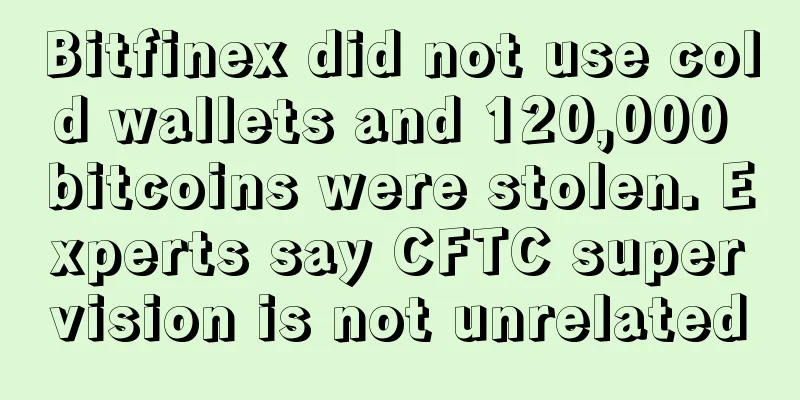Bitfinex did not use cold wallets and 120,000 bitcoins were stolen. Experts say CFTC supervision is not unrelated

|
The theft of nearly 120,000 bitcoins from the Bitfinex exchange has caused a lot of discussion, with some prominent experts saying that the regulatory framework proposed by the CFTC may have hindered Bitfinex's use of cold storage and was one of the important factors leading to this tragedy. On June 2, Bitfinex was investigated by the U.S. Commodity Futures Trading Commission (CFTC) for allegedly violating the Commodity Exchange Act by failing to register as a futures broker and was fined $75,000. The CFTC stated at the time: " The Bitfinex platform allows users to borrow funds from other users and conduct leveraged and margin trading. In addition, Bitfinex did not actually hand over these bitcoins to traders. Instead, Bitfinex stored these bitcoins in wallets under its own control ," which violated the CFTC's commodity trading regulatory rules and forced Bitfinex to abandon cold storage. It is precisely because of the regulatory framework proposed by the CFTC that Bitfinex (and other exchanges) are unable to store users’ coins offline (cold wallets). This may also be the only factor that led to this security breach and the loss of nearly $65 million in Bitcoin. Is KYC/AML regulation justified?In the United States, the enforcement of Know Your Customer (KYC) and Anti-Money Laundering (AML) regulations is very strict, especially for companies that handle money transfers. Large companies like Bitfinex are required by law to record user data and store sensitive personal and financial information on their private servers. On the Bitfinex exchange, users need to verify a series of documents and identification, such as passports and bank information, which are kept by the Bitfinex exchange. If regulators such as the CFTC require it, the Bitfinex exchange needs to provide them with this information. Bitcoin expert Andreas Antonopoulos speculated that it was KYC and AML regulations that prevented the exchange from using cold storage.
There is no doubt that this Bitfinex incident once again reminds us of the importance of using cold wallets. |
Recommend
What kind of face is unlucky?
There are many things in life that are not satisf...
How many countries’ legal currencies can buy all Bitcoins?
Bitcoin is currently valued at $66,500 and is on ...
Chainalysis raises $1.6 million and signs agreement with Europol
Blockchain startup Chainalysis has signed a memor...
The secret of women marrying the right husband based on their appearance
Since ancient times, people have believed that me...
Overnight shorts launched another raid
Overnight, the bears launched another surprise at...
UBS, Innogy and ZF jointly develop blockchain car e-wallet, blockchain becomes the basic technology of future private transportation
If we can use our phones to pay in shops, superma...
Uncover the secrets of women's excessive sexual indulgence
A person's character and desires are reflecte...
The facial features that indicate a strong fortune throughout life
The facial features that indicate a strong fortun...
What are the facial features of the most difficult women to please?
People will meet all kinds of people in their liv...
What kind of person's face is very likely to be a backup or lover?
No matter who you are, no one wants to be treated ...
BTC breaks through the $62,000 mark with a daily increase of 3.36%
On April 13, the BTC price rose in the short term...
Can a woman with thick lips bring good luck to her husband? What do lips represent?
Are women with thick lips good for their husbands...
What does it mean when the lifeline of both hands is broken?
Everyone's palm lines are different. Some peo...
People with connected eyebrows are inflexible and tend to get stuck in a rut!
What does ligature eyebrows mean? Everyone's ...
Lanzou Cloud unlimited space free network disk resource sharing platform
As a well-known free online disk service provider...









